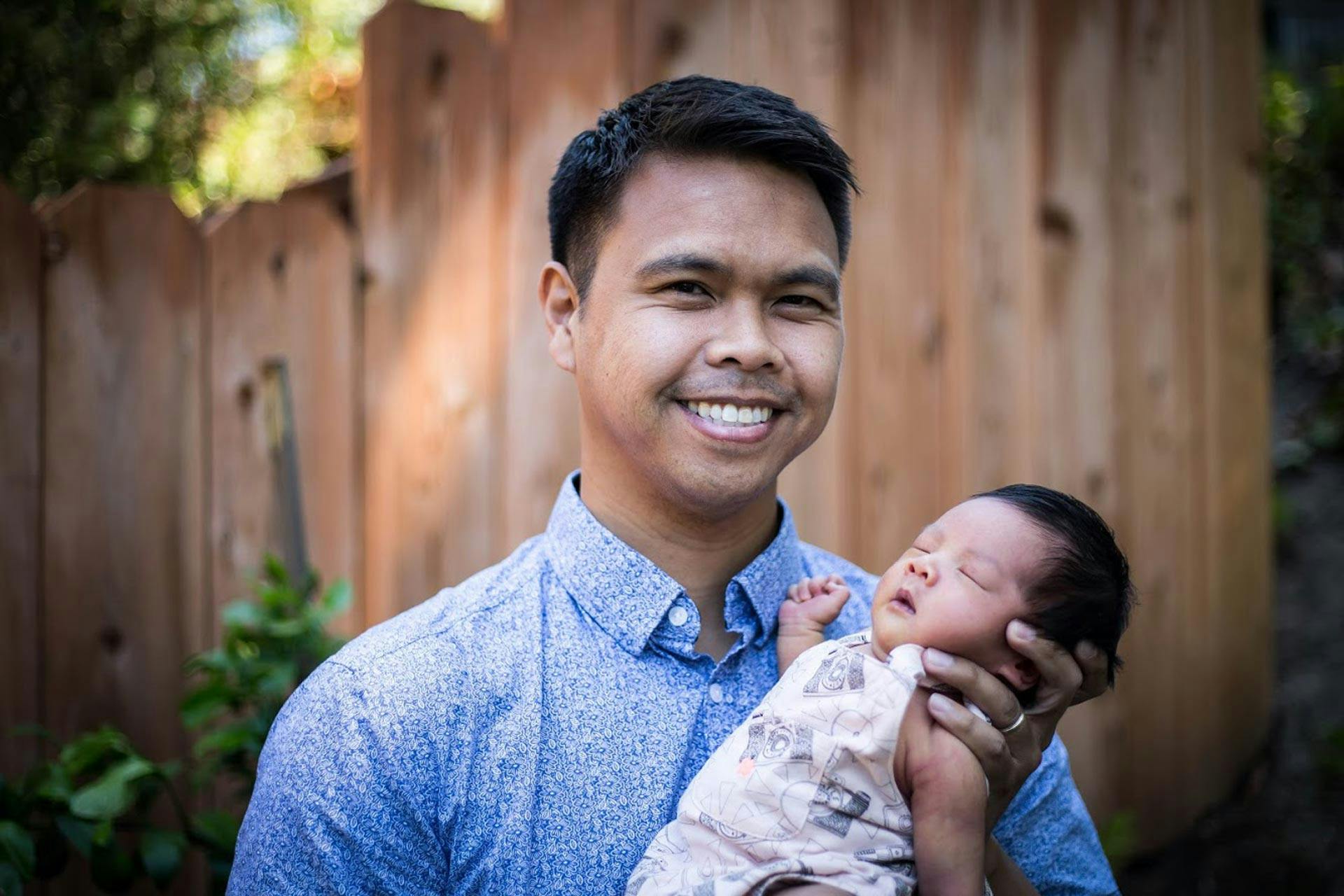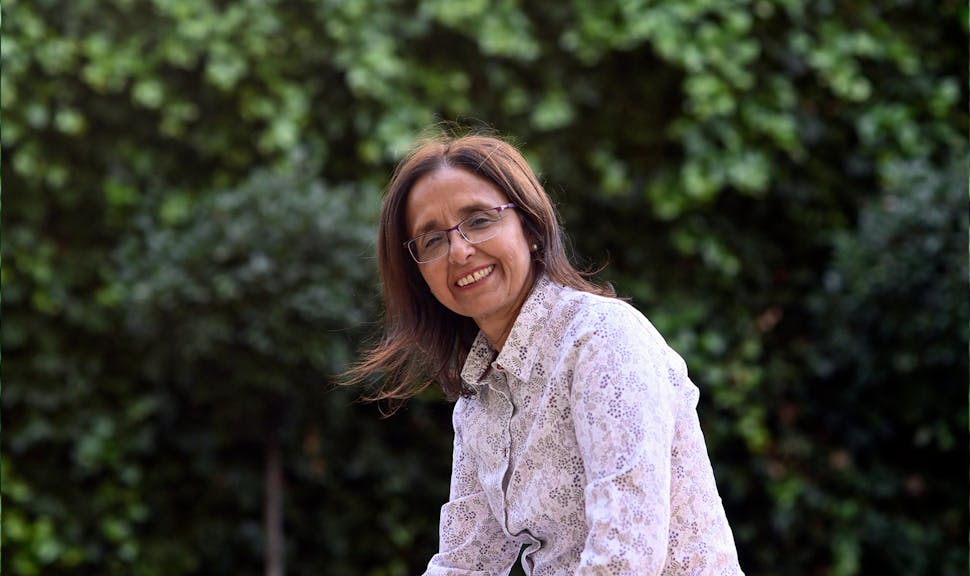
January 17, 2018
Parent policy: time for parents
7 minutes
For now more than a year, AXA employees all around the world have benefitted from a new parent policy, applicable to all types of family compositions: 16 weeks of paid leave for the primary parent* and 4 weeks for the co-parent**, plus the guarantee of returning to the same, or an equivalent, job. How do new parents feel about this new policy?
I was six months pregnant when I heard the news,
recalls Virginia Tanus. Currently a recruiting officer for AXA Assistance in Buenos Aires, Argentina, Virginia joined the Group in 2009 as a call-centre operator. Hearing about the Group’s new leave policy for welcoming a child was a great joy
for her. In Argentina, parental leave is usually three months for the mother, and only five days for the father. There, as in many countries, there is no talk for now of primary parents or co-parents. Unfortunately, the possibility of homosexual couples raising children has so far not been included in company regulations, or in the law.
But in January 2017 at AXA, the same rule came into effect for all: 16 weeks of fully paid leave for the primary parent, and 4 weeks for the co-parent. For Virginia, there was an added bonus: she and her partner met as AXA employees, so they were both able to take advantage of the parent policy to welcome Felipe, born February 25, 2017. For Gonzalo, the young father, that meant twenty-five additional days of paid leave compared to other new parents in Argentina. We were both at the same meeting introducing the new policy, and we couldn’t hide our excitement!
recalls Virginia.

Gonzalo, Virginia and the little Felipe, born in February 2017
When you become a parent, you truly become aware of your relationship with time. If you are or have been a young parent, or know someone who is, you know what it's like: before the baby, you expect a change in schedule, with busier days and shorter nights. But you’re still surprised by how all-consuming your new lifestyle is, and it quickly becomes quite demanding. In fact, this is the first point brought up by new parents when interviewed about their experience: the need to be organized as a couple and to be able to rely on one another. In short, to live out the experience together, day after day.
Dennis Lim, a manager for Rosenberg Equities at AXA Investment Managers in California, in the United States, also appreciates having been present throughout the weeks that followed the birth of his second daughter, Cecily, born in June. She was just a few days old when he answered our questions from his home in Orinda, California, a small city near San Francisco. He believes everyone should be able to enjoy this advantage. After all, if you have the misfortune of missing out on the period that follows the birth of a child, it can never be made up,
he says. But in another American company, he would have only benefitted from two weeks of parental leave. When I heard about the launch of this new parent policy, I couldn’t believe it. But for now, I mostly see its practical side. Taking care of a newborn at every hour of both day and night is incredibly difficult, and it’s complicated to do anything else. That’s even more true for the mother. Recovering from such an important physical change, which lasted nine months, while getting up every two hours to feed the baby… That's really hard. I do everything I can to help her get back into shape. And she likes the fact that I can’t use the excuse of having ‘too much work’ to avoid changing the diapers,
he adds with a laugh.
This new parent policy has brought greater flexibility to the way we work, with the ability to adapt one’s working hours during these precious moments, which is crucial!


Beyond the legal timeframes, the parent policy is also about individual people, and must be adapted on a case-by-case basis. This trusting employer-employee relationship is typical of human relationships at AXA and means this new inclusive policy can be adjusted to the specific needs of each employee. It also offers genuine flexibility: the leave can be taken all at once or fractioned – depending on local legislation in force – to suit one's professional agenda and personal obligations.
Stéphane Livet, a manager with the Human Resources Division at AXA Banque in France, was able to split his leave into two periods. First I took two weeks off after the birth, then returned to work for a few days to put my files in order, then took an additional two weeks off to fully enjoy the leave. It was a joint decision made by my partner, me… and my manager, who approved of this arrangement.
Stéphane’s wife, Charlène, also works for AXA Banque and additionally benefited from banking sector collective agreements. She stopped working at the beginning of February, with an expected due date at the end of March and a return to work in early September. Gabriel is their second child, following a daughter born in November 2013. In terms of managing nights, diapers and meals, the couple knew what they were in for – to a degree. This time around, they had to add in trips to school for their first child, and anticipate how drastically days would be shortened by taking care of two little ones! Luckily, I have the advantage of being able to work from anywhere. I can leave the office early and work from home if I want, even if, naturally, this isn’t mandatory. Personally, I think it's great to be able to work from home,
says Stéphane.
AXA's Global Parental Leave Policy
Clearly, the global framework that allows employees to take fuller advantage of their time to welcome a new child is all the more successful because it is combined with a flexible company culture based on trust. This flexibility and trust are essential to ensuring employees fully benefit from this policy.
The flexibility of the parental leave policy also proved invaluable to Karima Batal, based in Rabat, Morocco. As an operations analyst on a 140-person team at AXA IT, she is in charge of resolving major IT incidents. In theory, her maternity leave should have been aligned with Moroccan legislation: three months and fourteen days, paid at only 60 percent of her initial salary. Karima gave birth in December, less than a month before the new parent policy was rolled out. As recommended by the Group, AXA Tech nevertheless granted her all the advantages of the new policy, and she received her full salary. Karima was also able to adapt her hours to suit her new lifestyle. Previously she worked a rotating shift with hours ranging from 6 am to 8 pm. Thankfully, for one year, Karima worked regular, rather than rotating, hours, which enabled her to establish a routine. Her husband, Karim, even decided to stop working for one month, without pay, to spend more time with the baby.
Employed by another multinational corporation, he only received three days of paid paternity leave.
Welcoming a baby into one’s life is, in equal measure, a joy and an intense journey, and taking care of a child in the first days, weeks and months is a full-time job. The parental leave for welcoming a new child is designed to give all parents – regardless of their life’s path, status or country of origin – a maximum opportunity to succeed and take full advantage of this adventure.
How AXA set an example for Belgian legislators, by Wim Pauwels, Head of Communication, AXA Bank Belgium, and adoptive father of Sam
“Just before AXA's parent policy came into force, I decided to send an open letter to the Belgian newspaper De Standaard. Thanks to AXA’s new policy, as a primary care parent I am entitled to sixteen weeks of paid leave to welcome a child, whether it's a birth or an adoption.
The section on adoption in particular was in stark contrast to Belgian legislation, which provides for six weeks of leave per adoptive parent for children up to age 3, and four weeks for older children. In the case of a birth, the mother and father benefit from wider possibilities in terms of leave, with fifteen weeks and two weeks, respectively. I didn’t understand how a private employer had succeeded in treating adoptive and natural parents equally, where the government had failed.”
My open letter was published on December 28, 2016. Almost all day, I received calls from journalists from other newspapers asking me to explain AXA’s Parent policy and to share our adoption story. Different journalists also called representatives of the Belgian Parliament’s majority political parties, asking them to explain their point of view on this issue. By the end of the day, the majority parties had practically reached an agreement to progressively align the adoption leave with the birth leave. In 2027 at the latest, adoptive parents will also be entitled to seventeen weeks of adoption leave, which can be shared between the two parents, in reference to the current 15 weeks of leave for the mother and 2 weeks of leave for the father.
I really think my open letter on AXA’s best practice accelerated the discussion between political parties. Even though the ultimate change in legislation has yet to be approved by the Belgian Parliament, a meaningful social debate has nonetheless ensued.”



